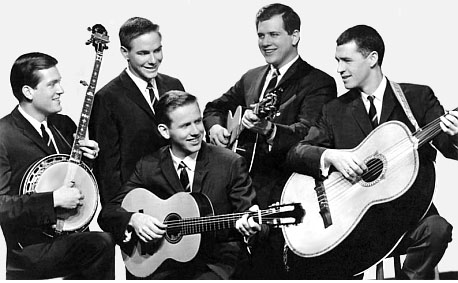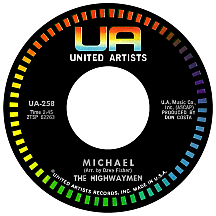THE HIGHWAYMEN
Michael
"What's in a name? That which we call a rose by any other word would smell as sweet." Perhaps it is so. But this line from the second scene of the second act of William Shakespeare's 1597 stage play Romeo and Juliet couldn't have taken into account the notion that in the media-saturated environment of the 20th century a misstep in naming might result in a negative public reaction. In the case of music groups, it's possible for success or failure to hinge on just such a designation (which may account for the proliferation of banal, meaningless monikers among popular music groups). Take for example the folk music quintet assembled by Dave Fisher at Wesleyan University in Middletown, Connecticut. A fondness for traditional Irish and Scottish songs made The Clansmen seem like a logical way to identify themselves; it was, after all, a common term for ancient Celtic communities of Ireland and Scotland's much later Gaelic kinfolk. Of course in North America the word, with a slightly different spelling, had acquired a negative connotation over the course of nearly a century. Common sense would suggest the name be changed, preferably sooner than later.
In the fall of 1958, New Haven, Connecticut native Fisher, a piano and banjo player and fan of The Weavers, fell under the spell of the explosive Kingston Trio and recruited three fraternity brothers at Wesleyan (an all-male school at the time) for his group. Tenor Bob Burnett was born in Providence, Rhode Island and had grown up near Mystic Seaport on the Connecticut coast. Baritone Chan Daniels' parents were American, though he was born in Argentina. Bass Steve Butts hailed from New York City. New Jersey-born guitarist Steve Trott spent his teenage years in Mexico City. After several auditions, well-known New York manager Ken Greengrass took them under his wing and immediately insisted on a new name. "A highwayman comes riding...riding...riding," from British writer Alfred Noyes' 1906 poem The Highwayman, felt like a great fit for a folk act and after some demo recordings were made and sent around, United Artists Records offered a contract to The Highwaymen.
Don Costa produced the five man band's eponymous debut album, which included one greatly underestimated track. "Michael" (recognizable by its first line, 'Michael, row the boat ashore...'), a Civil War-era song popular among slaves who lived along the coast of Georgia, produced with a whistling intro and a softer arrangement than most recorded versions, was released in September 1960 as the B side of "Santiano," a song set in the 'Californ-i-a' Gold Rush of 1849. At first the single bombed, but after several months, "Michael" caught the interest of radio programmers, gradually picked up airplay and surprisingly landed at number one in September 1961; a month later, it also topped the U.K. charts while fending off a version by Lonnie Donegan.
A sophomore album, Standing Room Only!, was readied and the next single, "The Gypsy Rover," penned by Irish singer-composer Leo Maguire, began receiving airplay in the fall, though it stalled in December as the flip, "Cotton Fields," a remake of Leadbelly's catchy 1940 folk tune ('When I was a little bitty baby my mama would-a rock me in the cradle...'), jumped over it and spent most of January and February '62 in the top 20. So how many 16 hour workdays do you figure five people can handle on a regular basis? The Highwaymen found out as they made frequent television appearances (The Tonight Show with Jack Paar, The Ed Sullivan Show) in between concerts around the country, all the while continuing their studies with an eye on graduating from Wesleyan in June. Another Civil War song, "I'm on My Way" (from third album Encore) made a one-week chart stop in April.

Once the cap-and-gown ceremonies wrapped for all five all at once, Trott left the group and headed for Harvard Law School. His replacement, Gil Robbins, played bass and guitarron (that large-bodied guitar popular with mariachi bands) and came with a strong resumé that included stints with The Cumberland Three (the Kingston Trio's John Stewart was also a member) and The Belafonte Singers (a large, ever-changing mixed-race group that backed Harry Belafonte and made recordings of its own). The final charting single for the Highwaymen, less than a year after their chart-topping triumph, was "The Bird Man," a tie-in to the movie Birdman of Alcatraz starring Burt Lancaster (the recording featured spoken clips by Burt in his character of real-life convicted killer Robert Stroud).
Burnett joined the Army Reserve that summer for six months' training and the remaining members moved to Greenwich Village in order to be close to (and a part of) folk music's epicenter. They appeared regularly at the Gaslight Cafe - for no pay! - in order to try out new material; by February 1963 Burnett was back, they had moved to San Francisco and were opening at the Hungy i nightclub for Woody Allen (they were often booked with him during his standup days). Despite a number of fine singles ("All My Trials" came up short behind a pop version by Dick and DeeDee and "Universal Soldier," released with the blessing of songwriter Buffy Sainte-Marie, wasn't a hit until Donovan and Glen Campbell had competing versions two years later), the group failed to register anything resembling a hit. Hootenanny With the Highwaymen, a "live" album (but not really - family and friends were invited to witness the recording at Bell Sound Studio in New York) was highly entertaining but suffered from low sales. After three more albums, continued appearances on TV (The Tonight Show with Johnny Carson, Hullabaloo) and a last-ditch uptempo take on their signature number, "Michael '65," the quintet called it quits.
Without missing a beat, another Highwaymen group popped up on ABC-Paramount. Alan Scharf, Renny Temple, Mose Henry and Roy Connors (all but Scharf had previously comprised The Vikings Three) were booked into Cafe Wha? in the Village using the now-famous name; two albums and four singles were issued through mid-1966, all with Fisher's consent and some involvement on his part. The name was then laid to rest for the better part of two decades. Gil Robbins (father of Oscar-winning actor Tim Robbins) pursued various music and acting projects, while Dave Fisher composed music for TV (B.J. and the Bear, The Fall Guy, a 1987 pilot movie for a short-lived high-tech action series ironically titled The Highwayman...and much more).
At various times, all the members of Wesleyan's star singing group reunited to perform together (with the exception of Chan Daniels, who died of pneumonia in 1975). Suddenly, another act appeared using the name; Waylon Jennings, Willie Nelson, Johnny Cash and Kris Kristofferson, under their individual names, had recorded a Jimmy Webb song, "Highwayman," which hit number one on the country charts in 1985. Later the superstar foursome toured and recorded under the name inspired by the hit...and Fisher's original group filed a lawsuit. Somehow, all The Highwaymen found a way to get along and in October 1990 both bands performed together at the Universal Amphitheater in Los Angeles.


